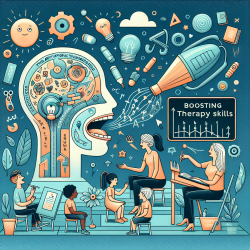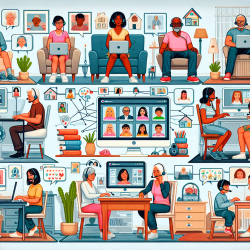The research paper titled "The mouse that trolled: the long and tortuous history of a gene mutation patent that became an expensive impediment to Alzheimer's research" by Bubela, Vishnubhakat, and Cook-Deegan (2015) presents a cautionary tale about the impact of patents on scientific progress. This case study highlights the challenges and setbacks faced by Alzheimer's research due to the patenting of a rare genetic mutation. For practitioners in the field of online therapy and special education, understanding these dynamics is crucial for improving their research and practice.
The Research Context
The study revolves around a double mutation in the Amyloid Precursor Protein (APP) gene, known as APPswe, which was linked to early-onset Alzheimer's disease. The mutation was discovered in the early 1990s and patented by Dr. Michael Mullan. The patent was later assigned to the Alzheimer's Institute of America (AIA), a non-practicing entity (NPE) or "patent troll." AIA enforced its patent rights aggressively, leading to numerous costly litigations against research institutions and companies.
Key Findings and Implications
The study's findings reveal several critical points for practitioners:
- Patent Enforcement and Research Impediments: AIA's litigation against research institutions created significant financial and operational burdens. This impeded Alzheimer's research by limiting access to essential genetic tools and models.
- Non-Disclosure and Ownership Issues: The case highlighted the importance of proper disclosure and ownership of research findings. Mullan's failure to disclose co-inventors and the inappropriate assignment of patent rights led to legal complications.
- Policy Implications: The study questions the value of patents in the biomedical research ecosystem, especially when controlled by NPEs. It suggests the need for policy reforms to protect research from such impediments.
Practical Steps for Practitioners
Practitioners can take several steps to mitigate the impact of patents on their research and practice:
- Collaborate and Share: Foster a collaborative research environment that encourages sharing of data and tools. This can help circumvent the restrictive impact of patents.
- Stay Informed: Keep abreast of legal and policy changes related to patents and intellectual property. Understanding these dynamics can help navigate potential legal challenges.
- Advocate for Reform: Support and advocate for policy reforms that promote open access to research tools and mitigate the impact of NPEs on scientific progress.
By understanding the lessons from this case study, practitioners can improve their research practices and contribute to a more open and collaborative scientific community.
To read the original research paper, please follow this link: The mouse that trolled: the long and tortuous history of a gene mutation patent that became an expensive impediment to Alzheimer's research.










